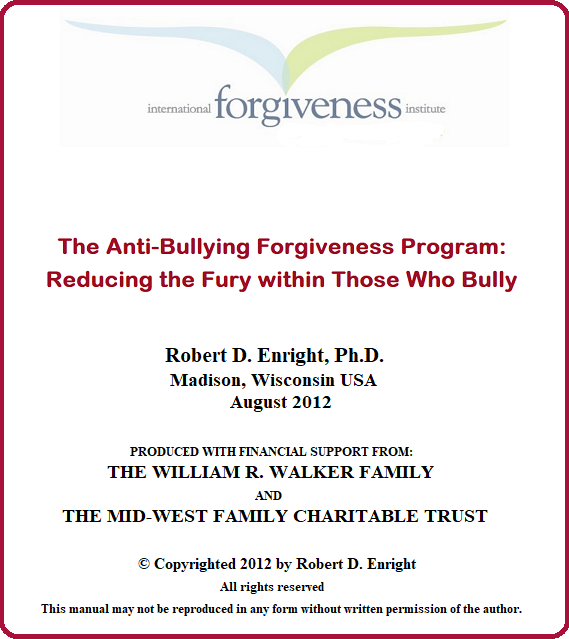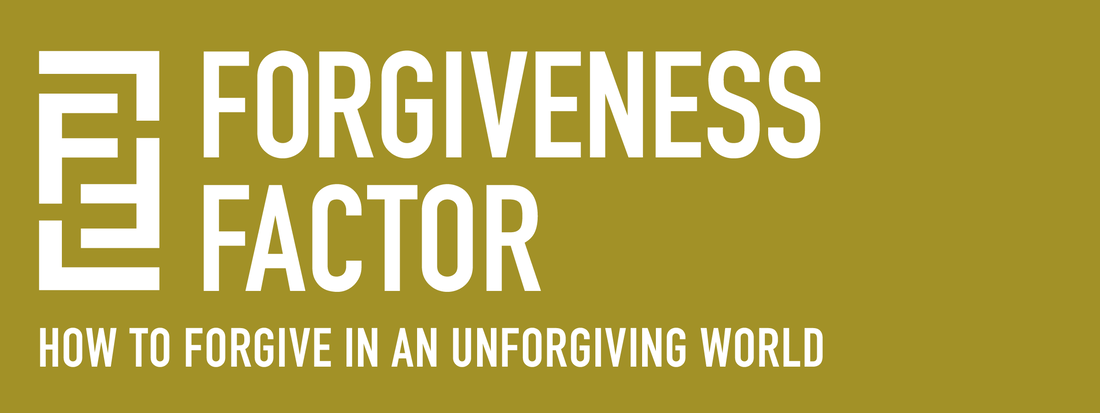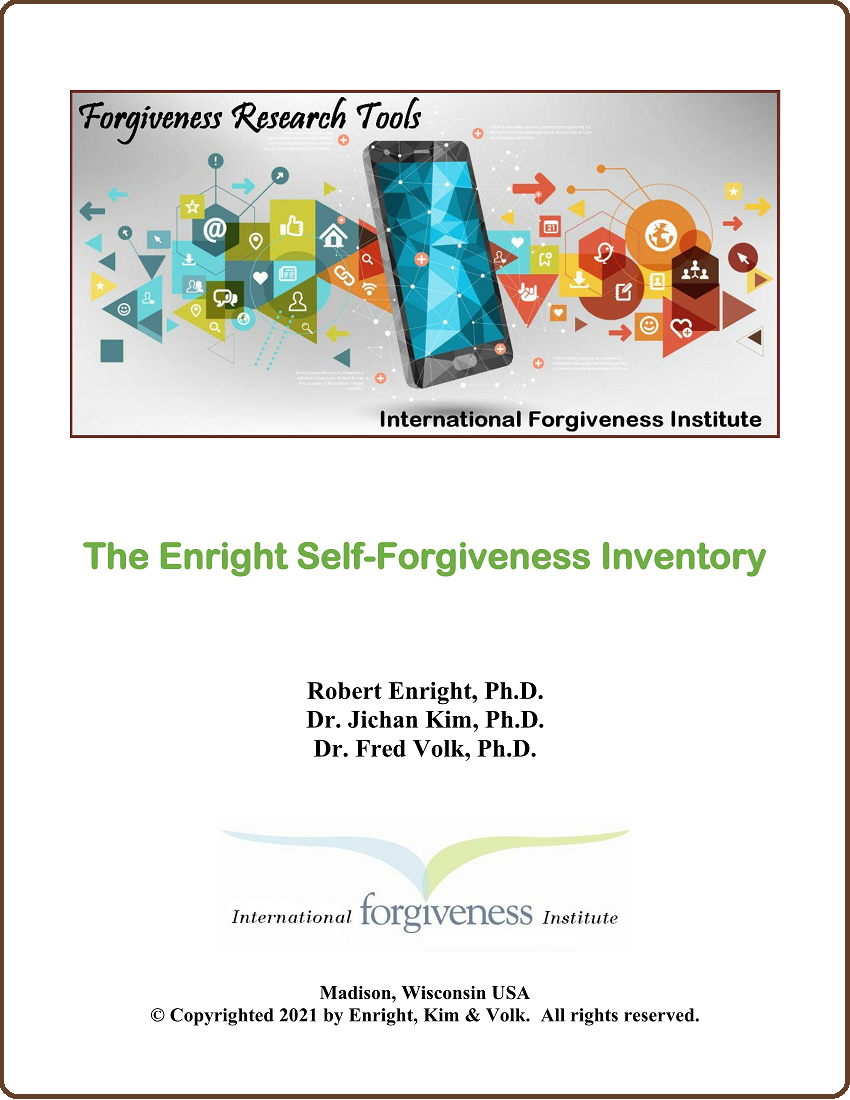Forgiveness News
Research Study in Spain Endorses Dr. Enright’s Anti-Bullying Forgiveness Program
A pioneering research study conducted with primary and secondary teachers and students in Spain has support for Dr. Robert Enright’s ideas on anti-bullying, which offers forgiveness education to those who do the bullying. His original Anti-Bullying Forgiveness Program is available on our website.
Two recommendations in the study in Spain are these:
1) That school administrators “incorporate education in forgiveness into bullying prevention programs;” and,
2) That “forgiveness-based education, as an empirically supported approach to reducing anger, may be one of the answers to peace within conflict zones and societies.”
The study, Evaluation of the effectiveness and satisfaction of the “Learning to Forgive” program for the prevention of bullying, was published this month in the Electronic Journal of Research in Educational Psychology. It was conducted by psychologists at the University of Murcia—one of the largest and oldest universities in Spain (established in 1272)—with technical and procedural guidance from Dr. Enright himself.
The “Learning to Forgive” program that was the focal point of the new study, was inspired by The Anti-Bullying Forgiveness Program developed by Dr. Enright in 2012 based on his now more than 35 years of research into forgiveness. Forgiveness education as a way of reducing excessive anger has been tested and used for more than 17 years in schools located in places such as Belfast, Northern Ireland, and more recently in Monrovia, Liberia (West Africa), Iran, and Pakistan.
The purpose of the antibullying forgiveness program is to help students, who bully others, to forgive those who have deeply hurt them. It is based on the understand that bullying behavior does not occur in a vacuum, but instead often results from a deep internal rage that is not originally targeted toward the victims of those who bully. In other words, those who bully oftentimes are displacing their built-up anger onto unsuspecting others.
To help those who bully to forgive is to reduce the excessive anger that can be a direct motivation for hurting others. In this way forgiveness can be a powerful approach to reducing repressed anger and eliminating bullying behavior.
“This program tries to change the typical understanding, often incomplete, that we usually have about forgiveness,” according to the study in Spain. “With a deeper understanding about what forgiveness is, then the students may show less resentment, fewer relationship breaks, and less unpleasant emotions over time. Teaching young people this more complete view of forgiveness might avoid, in the words of Enright himself, many sufferings in adulthood.”
Study participants consisted of 88 primary and secondary school teachers at 11 educational centers and 153 students at 4 educational centers. In Study 1 of the two-part research project, “statistically significant improvements were found in the forgiveness group regarding their knowledge of forgiveness and marginally significant in emotional forgiveness compared to the control group.”
In Study 2 participants noted “high satisfaction with the program and that it had helped them forgive in a remarkable way. In line with other studies, it is recommended to incorporate education in forgiveness into bullying prevention programs.”
According to the study authors, their research as well as other studies indicate that “forgiveness is a protective factor against emotional problems and prevents victims of harassment from now demonstrating bullying behavior toward others.” They also recommended adding in-depth modules for adults who could then provide in-home reinforcement in helping students achieve and maintain their forgiveness-related skills.
“The results of these two pioneering studies in Spain on the ‘Learning to Forgive’ Program inspired by the research of Robert Enright and his team show positive results, both in teachers and students,” the report concludes. “The promotion of interventions based on empathy, compassion, and forgiveness contribute to sowing the path of peaceful coexistence.”
Read the complete English translation of the Spanish bullying-prevention study.
Read the complete Spanish version of the study.
Learn more about The Enright Anti-Bullying Forgiveness Program:
- A School Anti-Bullying Program That Works
- The Anti-Bullying Forgiveness Program – FREE for a Limited Time
- Can We Get Anti-Bullying Programs to Work?
- Obtain the Anti-Bullying Forgiveness Program
How is Hockey Related to Forgiveness?
EDITOR’S NOTE: This blog is reposted from Forgiveness Factor, the website of Tim Markle, a contributing writer and speaker for the International Forgiveness Institute (IFI). Markle says his two major aspirations in life are “helping individuals with developmental disabilities and educating people about the benefits of forgiveness.”
I like watching ice hockey. Live is best (if I could afford it and if there was not a worldwide pandemic), but I also enjoy watching it on TV. When I watch other sports, I think to myself, “I could throw or run a football, I could catch a baseball, I could kick a soccer ball, I could dribble a basketball–nowhere near the level of proficiency of a, well, 7th grader, but I could do it.” But hockey–not a chance.
There is so much about hockey I could never do. Let’s just start, and end, with skating on ice. Not going to happen. As I watch the games, I see hard hits, slap shots, precise passing. But what brought forgiveness to mind was watching someone skate the puck up the ice as they were constantly poked, prodded, slashed, blindsided, bothered and battered just for doing their job.
Sometimes forgiveness is hard because it feels like we are being constantly poked and reminded of the pain some else caused. We can be blindsided by a memory or prodded by anger.
The hockey player keeps his feet moving, his stick moving, the puck moving and keeps his eyes on the goal. It can be the same with us. When life wants to bounce us around, keep moving forward. Remember the goal of forgiveness. Remember the rewards of the goal are less anger, less anxiety, less depression, less stress, more confidence, more joy, and a better quality of life. Keep your eyes on the goal, keep moving forward and if you get knocked down, get back up and find that puck.
ABOUT THE AUTHOR: Tim Markle is an Outreach Specialist at the University of Wisconsin-Madison Waisman Center. In his various capacities, Markle works to improve the lives of children and adults with developmental disabilities and neurodegenerative diseases, some of life’s most challenging conditions. He also develops curriculum for a variety of audiences, provides training for both children and adults, and is a prolific speaker.
 Markle has a BA in Psychology from Bowling Green State University, a Masters in Counseling (MC) from John Carroll University, and a Master of Arts in Christian Studies (MACS) from Trinity Evangelical Divinity School. As the capstone project for his MACS degree, Markle developed a six-week course that focused on how to forgive and why forgiveness is indispensable for dealing with anger, depression, anxiety and trauma. The course is based on the ground-breaking work of Dr. Robert Enright, co-founder of the IFI. Markle is also the founder of a forgiveness education organization called Forgiveness Factor.
Markle has a BA in Psychology from Bowling Green State University, a Masters in Counseling (MC) from John Carroll University, and a Master of Arts in Christian Studies (MACS) from Trinity Evangelical Divinity School. As the capstone project for his MACS degree, Markle developed a six-week course that focused on how to forgive and why forgiveness is indispensable for dealing with anger, depression, anxiety and trauma. The course is based on the ground-breaking work of Dr. Robert Enright, co-founder of the IFI. Markle is also the founder of a forgiveness education organization called Forgiveness Factor.
Coveted Forgiveness Research Tools Now Available at No Cost
The man Time magazine has called “the forgiveness trailblazer” is blazing forward in a new direction by offering to social science and moral development researchers around the world the accumulation of forgiveness research tools he has developed over the past 35 years. And he is giving them away at no cost and with no strings attached.
Dr. Robert Enright, co-founder of the International Forgiveness Institute (IFI), announced today that he is now providing his highly regarded scientific research tools absolutely free to any forgiveness researcher who requests them.
“This initiative is designed to help expand and broaden the growing collection of crucial forgiveness knowledge,” Dr. Enright says. “This area of moral development has already had significant impacts in the realms of education, medical treatment, and emotional therapy, so why not try to expand on that?”
 Often introduced as “Dr. Forgiveness” because of his 35-year academic commitment to researching and implementing forgiveness programs, Dr. Enright is acknowledged as the unquestioned pioneer in the scientific study of forgiveness. The research tools he and his associates have developed have become highly coveted tools because of his meticulous validation of the scientific procedures he employs.
Often introduced as “Dr. Forgiveness” because of his 35-year academic commitment to researching and implementing forgiveness programs, Dr. Enright is acknowledged as the unquestioned pioneer in the scientific study of forgiveness. The research tools he and his associates have developed have become highly coveted tools because of his meticulous validation of the scientific procedures he employs.
All of Dr. Enright’s research is done in conjunction with the University of Wisconsin-Madison where he is a Professor of Educational Psychology. You can access his peer-reviewed empirical studies, research abstracts, and published studies at Forgiveness Research.
In addition to sharing his research results, Dr. Enright is now making available his user-validated forgiveness research tools at no cost. Those tools include:
- The Enright Forgiveness Inventory-30 (EFI-30) – This tool is a shorter version of the Enright Forgiveness Inventory for Adults that has become the interpersonal forgiveness measure of choice for research professionals in the U.S. and abroad since its development in 1995. The EFI-30 reduces the number of items from 60 to 30 for the purpose of a more practical assessment of this construct. Data from the United States were used in the creation of the new measure and applied to seven nations: Austria, Brazil, Israel, Korea, Norway, Pakistan, and Taiwan to develop its psychometric validation.
. - The Enright Self-Forgiveness Inventory (ESFI) – This measure is based on the conceptualization of forgiveness as a moral virtue. The ESFI is a 30-item scale featuring six subscales with five items each. Five additional items at the end of the scale allow for measurement of pseudo self-forgiveness (PSF). Although several competing self-forgiveness measures exist, Dr. Enright’s is the only one that captures the idea that self-forgiveness is a moral virtue that includes behavior toward the self.
. - The Enright Group Forgiveness Inventory (EGFI) – Newly validated and published earlier this year, the EGFI has 56 items across seven subscales with each subscale having eight items. Those subscales measure a group’s motivation and values regarding forgiveness, peace, and friendliness toward the other group. Like the ESFI, it also has a PSF component and has dramatic implications for its ability to enhance peace efforts in the world.
.
To develop and validate the EGFI, Dr. Enright worked with a team of 16 international researchers who collected data from 595 study participants in three different geographic and cultural settings of the world—China and Taiwan, Slovenia, and the US. The study team’s findings documented that this new measure has strong internal consistency as well as convergent and discriminant validity.
. - The Enright Forgiveness Inventory for Children (EFI-C) – The EFI-C is an objective measure of the degree to which a child forgives another who has hurt him or her deeply and unfairly. It is a 30-item scale similar to the 60-item adult version and is presented orally to very young children and in writing to those who can read well. Thanks to a researcher in Pakistan, the EFI-C is now available in the Urdu language—the native language of an estimated 230 million people, primarily in South Asia.
Dr. Enright is the author or editor of seven books. He published the first social scientific journal article on person-to-person forgiveness and the first cross-cultural studies of interpersonal forgiveness. He also pioneered scientific studies of forgiveness therapy and developed an early intervention to promote forgiveness–the 20-step Process Model of Forgiving.
By publicly sharing all his research studies and results in more than 100 publications over the years, Dr. Enright has earned recognition as being in the forefront of the science of forgiveness. The Los Angeles Times described Dr. Enright as “the guru of what many are calling a new science of forgiveness.” The Christian Science Monitor called him “the father of forgiveness research.”
Learn more about Dr. Enright’s free tools on the Forgiveness Research Tools page.
How to Find a Therapist Who Has Forgiveness Therapy Training
Because Forgiveness Therapy interventions are becoming standard practice for more and more psychologists and others in the helping professions, the demand for the International Forgiveness Institute’s (IFI) Forgiveness Therapy Continuing Education Course continues to grow. As far as we know, the IFI course is currently the only one available that provides in-depth training for forgiveness therapy so those who have completed the course are a unique group of trailblazing professionals. Our course is based on the clinical manual also called Forgiveness Therapy that is authored by IFI co-founder Dr. Robert Enright (a licensed psychologist) and Dr. Richard Fitzgibbons, an MD and a psychiatrist.
Those who successfully complete the course receive a completion certificate from the IFI that can be displayed in clinics and offices alongside other professional credentials. Those individuals may also, of course, advertise their forgiveness expertise in their clinical promotions and printed materials. That means the best way to find a therapist who has trained with the IFI is to ask the practitioner if he or she has undertaken forgiveness therapy training and, if so, who provided that training. Don’t be afraid to ask for documentation of that training (i.e., an IFI Certificate of Completion).
The best advice we can give on finding a therapist is to follow the step-by-step guidance we provide on our website in the section called “Find a Helping Professional.” There you will be able to access valuable fact sheets like “How to Choose a Psychologist” and “How Do I Find a Therapist Near Me?” If you think online therapy might be a viable option to consider, you will find guidance in our article “Reasons to Choose an Online Therapist.” More importantly, that page of our website includes links to three different reputable agencies, including the American Psychological Association, that provide no-cost services to help you locate a helping professional by geographic area or practice area. You’ll find all that at our “Find a Helping Professional” section.
NBA Head Coach Urges Forgiveness for Driver Who Caused Death of His Wife
Anyone who follows the National Basketball Association (NBA) will know that Monty Williams is the head coach of the Phoenix Suns. What they might not know is that when Williams delivered the eulogy for his wife who was killed in a head-on car crash five years ago, he urged forgiveness and prayers for the driver who took his wife’s life and injured three of his children.
Williams and his wife Ingrid, 44, had been married for 20 years before she died on Feb. 10, 2016, from injuries sustained a day earlier in that crash. The car Ingrid was driving was struck head-on by an SUV that was traveling at 88-92 mph in a 40-mph zone and which crossed the center line after losing control. The other driver, Susannah Donaldson, died instantly in the collision.
Instead of blaming Donaldson, Williams used the death of his wife to preach forgiveness. At Ingrid’s memorial service, Williams delivered a powerful seven-minute eulogy in which he advocated forgiveness for Donaldson and prayers for her family.
“The most important thing we need to understand is that everybody is praying for me and my family,” Williams said at Ingrid’s funeral. “But let us not forget that there were two people in this situation and that family needs prayer as well. We have no ill-will toward the Donaldson family.”
The memorial service for Ingrid was attended by more than 900 people. Ingrid and Monty met while both attended Notre Dame where she competed in track and field and where Monty was a 6’8″ tall basketball star. At the time of the deadly crash, their five children ranged in age from 5 to 17.
“In my house, we have a sign that says, ‘As for me and my house, we will serve the Lord,’” Williams said. “We cannot serve the Lord if we don’t have a heart of forgiveness. Let’s not lose sight of what’s important and let’s not lose sight of that family that also lost someone they love.”
Just a year after his wife’s tragic death, Williams received the inaugural Sager Strong Award presented by the NBA to an individual who has been “a trailblazer while exemplifying courage, faith, compassion and grace.” Williams’ career in the NBA has spanned more than two decades with nine seasons as a player before serving as a coach or assistant for five different NBA teams. He became head coach of the Phoenix Suns in May 2019. He was also an assistant coach to Mike Krzyzewski (Duke University) for the men’s national basketball team that won the Gold Medal for the United States at the 2016 Summer Olympics in Rio De Janeiro, Brazil.
Watch the full seven-minute eulogy by Monty Williams.



